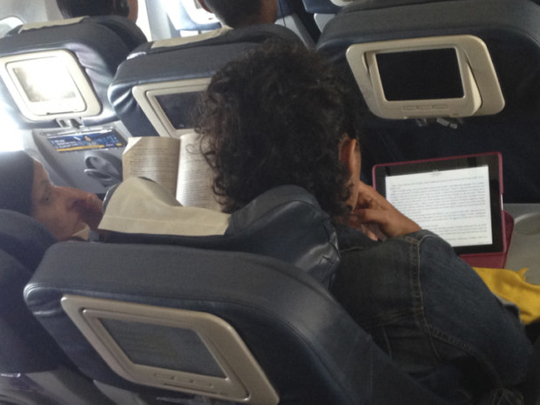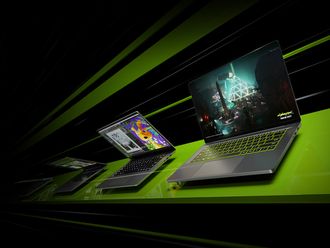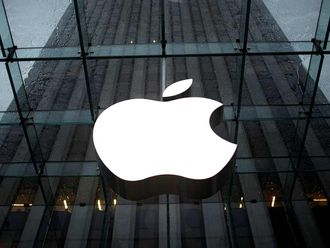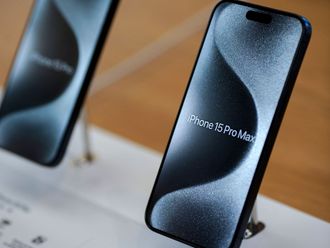
Paper books don’t need power sources, you can leave them unsupervised without panicking and they smell homely.
Tablets allow you to carry a huge library, hardly weigh anything at all and you can read them at night without leaving the light on and infuriating a partner.
The e-books versus traditional paper books debate will continue to rage until one or the other becomes obsolete, but it’s really just a matter of personal preference. A random survey of Dubai book readers reveals an equal mix of strong opinions from paper book readers, some of whom only understand a tablet as a small pill, to e-book readers who gaze so incessantly into a screen that onlookers fear they will lose the power to communicate with others.
South African Janee Pfeifer, 52, a travel specialist, is an e-book user who readily admits she loves her Kindle. “You can take it anywhere as it fits into a small bag, so on holiday, you don’t need to lug lots of books around. Kindle books are usually cheaper on Amazon than the hard copy — plus it saves trees,” she says.
She has a point, for an analysis conducted in 2009 by the market intelligence Cleantech Group, based in California, found that carbon emissions from electronic books were lower than those from traditional book publishing. At the same time, however, the use of water and toxic chemicals was found to be problematic in both print and digital publishing.
Whatever the ecological impact, Pfeifer says, “I’m addicted to my Kindle – I don’t go anywhere without it.” The same could be said for paper book user Maureen Stols, a counselling therapist from Australia, who takes her favourite dog-eared tomes wherever she goes. “I have a book in my hand when I’m on the couch, in the bath and in bed.”
British author Suzanne Kalloghlian reads in the same places as Stols but goes a step further into the bathroom for further contemplation, as does 31-year-old Brian Marsh, Briton, who supports both camps by reading both e-books and paper books depending on location. “I read e-books on flights as it’s convenient but read real books in the bathroom because you can’t beat the real thing,” he says.
He finds e-reading devices such as Kindle, Google Nexus and iPad successfully provide a close enough book-like experience when reading for longer periods.
South African home-maker Gail Holloway says, “I love real books; you can smell whether it’s new or old by simply turning over the pages.”
Teaching assistant Sooze Sims, from New Zealand, is also affected by the scent and feel of a paperback in her hands prior to going to sleep. “It gives me that soothing feeling and the ability to relax and nod off, while the electronic glow of a Kindle stimulates my mind and keeps me awake.”
Everybody is different, as South African sales agent Jo Marengo, 53, demonstrates for she has a Kindle that has an equally narcotic effect. “With my Kindle I read more because it’s easy to hold and I don’t think twice about tackling a really fat novel because if — or rather when — I fall asleep holding it, I don’t get a huge book falling on my face.
“It’s often in my bag when taking kids to extracurricular activities and was fabulous on the beach in Mauritius. Another great thing about a Kindle is that you can upload books on the move. I also don’t forget titles or lose the piece of paper I’ve written it on,” she adds.
Recent graduate, 22-year-old Guy Stuart, Briton, prefers the printed-on-paper word to digital books because he finds annotating the margins for university projects easier. Although e-books can mark up margins with comments it’s not quite as easy. But with the electronic devices, he says, “You can have more than ten books open at one time making it simpler to visually research sources.”
Appreciating the feel and smell of old books, he browses through second-hand book stores to build up his personal library. “E-book readers will not experience the fun of exploring for old books,” says Stuart, who also likes paper because sometimes the date and place of purchase is written on the inside, giving it a touch of character and a history.
So it appears that UAE Luddites will continue to revel in their paper books while techno-geeks will continue to download apps and books — and why not, provided each stick to their guns and neither forms go out of production.











